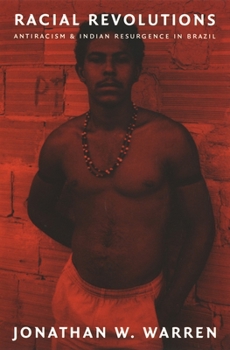Racial Revolutions: Antiracism and Indian Resurgence in Brazil
Select Format
Select Condition 
Book Overview
Since the 1970s there has been a dramatic rise in the Indian population in Brazil as increasing numbers of pardos (individuals of mixed African, European, and indigenous descent) have chosen to identify themselves as Indians. In Racial Revolutions--the first book-length study of racial formation in Brazil that centers on Indianness--Jonathan W. Warren draws on extensive fieldwork and numerous interviews to illuminate the discursive and material forces responsible for this resurgence in the population.
The growing number of pardos who claim Indian identity represents a radical shift in the direction of Brazilian racial formation. For centuries, the predominant trend had been for Indians to shed tribal identities in favor of non-Indian ones. Warren argues that many factors--including the reduction of state-sponsored anti-Indian violence, intervention from the Catholic church, and shifts in anthropological thinking about ethnicity--have prompted a reversal of racial aspirations and reimaginings of Indianness. Challenging the current emphasis on blackness in Brazilian antiracist scholarship and activism, Warren demonstrates that Indians in Brazil recognize and oppose racism far more than any other ethnic group.
Racial Revolutions fills a number of voids in Latin American scholarship on the politics of race, cultural geography, ethnography, social movements, nation building, and state violence.
The growing number of pardos who claim Indian identity represents a radical shift in the direction of Brazilian racial formation. For centuries, the predominant trend had been for Indians to shed tribal identities in favor of non-Indian ones. Warren argues that many factors--including the reduction of state-sponsored anti-Indian violence, intervention from the Catholic church, and shifts in anthropological thinking about ethnicity--have prompted a reversal of racial aspirations and reimaginings of Indianness. Challenging the current emphasis on blackness in Brazilian antiracist scholarship and activism, Warren demonstrates that Indians in Brazil recognize and oppose racism far more than any other ethnic group.
Racial Revolutions fills a number of voids in Latin American scholarship on the politics of race, cultural geography, ethnography, social movements, nation building, and state violence.
Designated a John Hope Franklin Center book by the John Hope Franklin Seminar Group on Race, Religion, and Globalization.
Format:Paperback
Language:English
ISBN:0822327414
ISBN13:9780822327417
Release Date:September 2001
Publisher:Duke University Press
Length:392 Pages
Weight:1.48 lbs.
Dimensions:1.1" x 6.2" x 9.2"
Customer Reviews
1 rating
Rethinking Brazil's Racial Paradigms
Published by Thriftbooks.com User , 18 years ago
Warren's RACIAL REVOLUTIONS is a welcome addition to the paradigm that questions traditional discussions of race, ethnicity, and culture in Brazil posited as a mere European vis-a-vis African framework. Warren skillfully traces the historical vicisitudes of organization by different indigenous groups to survive as distinct ethnic groups or "nations," the on-going disputes over ownership of natural and cultural resources on lands that clearly belong to indigenous communities, and the challenges of indigenous groups and individuals for access to justice. Within the paradigm shared by Warren, academicians should look more at the interplay and fusion of native and African cultures in the history of South America in the past 500 years.





